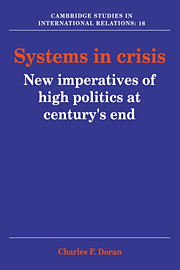Book contents
- Frontmatter
- Contents
- Preface
- Acknowledgments
- Introduction: new perspectives on the causes and management of systems crisis
- Part 1 Dynamics of state power and role: systems structure
- Part 2 Dynamics of major war and systems transformation
- Part 3 Dynamics of general equilibrium and world order
- Part 4 Systems transformation and world order at century's end
- 8 Systems change since 1945: instability at critical points and awareness of the power cycle
- 9 Is decline inevitable? U.S. leadership and the systemic security dilemma
- 10 Systems transformation and the new imperatives of high politics
- Appendix: Mathematical relations in the power cycle
- References
- Index
9 - Is decline inevitable? U.S. leadership and the systemic security dilemma
Published online by Cambridge University Press: 08 September 2009
- Frontmatter
- Contents
- Preface
- Acknowledgments
- Introduction: new perspectives on the causes and management of systems crisis
- Part 1 Dynamics of state power and role: systems structure
- Part 2 Dynamics of major war and systems transformation
- Part 3 Dynamics of general equilibrium and world order
- Part 4 Systems transformation and world order at century's end
- 8 Systems change since 1945: instability at critical points and awareness of the power cycle
- 9 Is decline inevitable? U.S. leadership and the systemic security dilemma
- 10 Systems transformation and the new imperatives of high politics
- Appendix: Mathematical relations in the power cycle
- References
- Index
Summary
Whether decline on the power cycle is inevitable for a state at some advanced stage of its international political development is a central historical and theoretical question. Must a state succumb to fatalism regarding its decline, or is decline perhaps a function of policy choice as much as some inexorable process or law? How great is the inertia of change on the power cycle, or conversely, how large is the realm of policy choice for society and decision maker in consciously directing structural change?
As long as decline is thought to be inevitable, neither theorists nor policy makers will seek alternatives to decline. Such acceptance of “inevitability” ironically introduces additional “uncertainty” into strategic policy planning, increasing the chances for a wrong decision. Conversely, if decline is not inevitable, policy makers will have a threefold task: to manage and try to control movement along the power cycle, to bring interests into line with new power relations, and to develop a strategic policy within these constraints that confronts security issues directly.
The question of U.S. decline is not simple, in terms of either the cause and extent of decline, the implications for U.S. security policy, or the choice of policy instruments. Nor is the question of Japan's rise so simple. The relationship between the U.S. and Japanese power cycles requires careful assessment. An error of grand strategy is more than a mistake for a single government. Bad strategic thinking can worsen both the economic situation and the security dilemma throughout the system.
- Type
- Chapter
- Information
- Systems in CrisisNew Imperatives of High Politics at Century's End, pp. 212 - 236Publisher: Cambridge University PressPrint publication year: 1991



